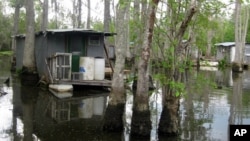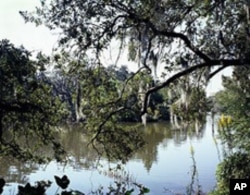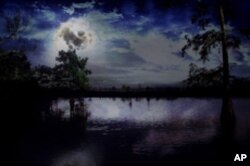In the movie, "The Big Easy," set in the historic and romantic old city of New Orleans, Louisiana, the hero and heroine at one point are running for their lives. They race from a French Quarter neighborhood, full of old street lamps and wrought-iron balconies, directly into a swamp to hide.
For this to happen in real life, the characters would have a long run, indeed. Louisiana's swamp country - Cajun country - is off by itself, 160 or so kilometers (100 or so miles) away in the southwest part of the state.
Fifty years ago and more, before the big interstate highway brought many tourists with cameras into their midst, Acadian - or Cajun - families, descended from French-speaking Catholics expelled from Canada in the 1700s, moved into these secluded wetlands. They found a way of life - fishing, scooping up tasty little crustaceans called crawfish, and trapping mink, otter, beaver, and muskrat.
Once mostly solitary and suspicious, many Cajuns have come to enjoy visits by curious strangers, and some have carved out a good living giving tours of the eerie cypress swamps, in which stumps from trees that were once wantonly harvested for shipment to Europe remain as underwater obstacles.
The guides seem to know every landmark among the stumps and dangling Spanish moss. They even know, or pretend to know, every alligator by name.
It's easy to get lost in this primordial, misty, mysterious place.
One can only imagine how scary it would be at night, with owls hooting, water snakes sliding past in the dark, the moon passing behind the silhouettes of trees, and that spooky story about voodoo rituals that you read the night before seeming all too real.






